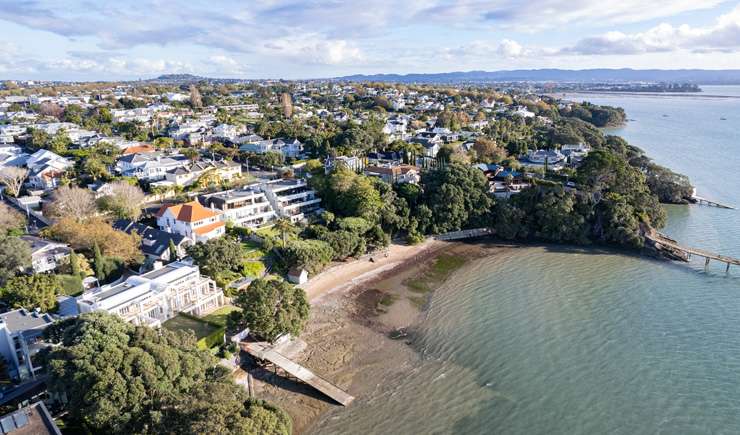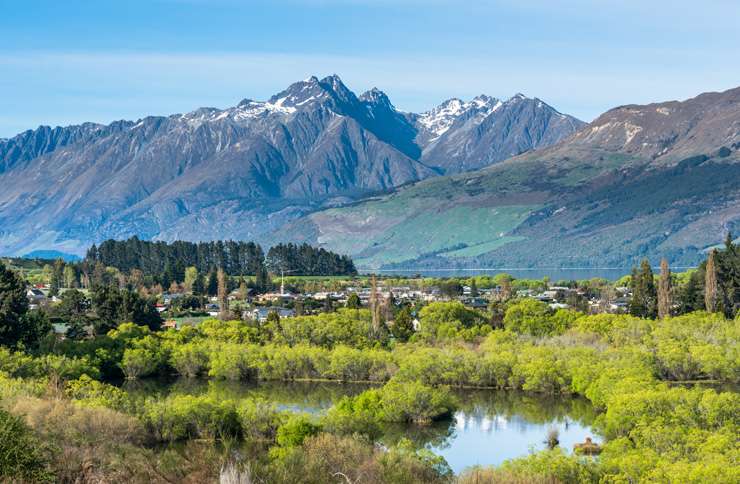Click here to download the report >
The housing market slump shows no signs of easing, with the nationwide average property value dropping 3.6% in the last three months, according to figures from the latest OneRoof-Valocity House Value Index.
All but two regions registered negative or zero value growth over the quarter, with house prices in Greater Wellington taking the biggest hit.
Start your property search
The region’s average property value plunged 8.6% ($97,000) over the quarter to $1.027 million, and is now $12,000 below where it was at the end of July 2021.
Auckland’s average property value was down a relatively modest 4.4% over the three months to the end of July - its fifth successive quarterly decline since the end of March - and is up just 5.1% year on year.
The slowdown has also finally spread to Canterbury. The region, which had been quite active in the first half of the year and recorded growth of 2.1% in the three months to the end of June, saw its average property value drop 0.4% over the quarter to $789,000.
The only regions to register value growth in the last three months were West Coast, up 2.3%, and Tasman, up 0.2%.
There’s still heat in Queenstown-Lakes' housing market too, with the TA’s average property value up 1.3% over the quarter to $1.879m, but the country’s other major metros are feeling the winter chill.
The capital’s average property value dropped 10% ($132,000) over the quarter to $1.187m, and is down $14,000 year on year. The value decline in Tauranga was 5.1% over the same period, and just over 3% in Dunedin and Hamilton, while Christchurch house prices dipped 0.4%.
James Wilson, head of valuations at OneRoof’s data partner, Valocity, said a range of factors had contributed to the value slides, including record-high inflation and rapidly rising interest rates.
“Most parts of the country experienced value declines over the last three months. Thirteen out of 16 regions and 56 out of 72 territorial local authorities were in negative growth territory - a sharp turnaround for a housing market that was still growing across all parts of the country at the start of the year.
“Worse still, property values in Auckland, Bay of Plenty, Gisborne, Hawke’s Bay, Manawatu-Whanganui, Nelson and Wellington are all below where they were six months ago.
“Properties in Lower and Upper Hutt, Porirua and Wellington are worth less now than what they were a year ago, with the slump reversing the gains made in the second half of 2021 and early 2022.
“Greater Wellington is by far the weakest link, with five of the region’s eight TAs suffering the country’s biggest value drops over the quarter.
“Conversely, three of the five best-performing areas were in the Canterbury region where comparatively low prices continue to attract buyers.”
Wilson said that dwindling sales volumes were another sign of market weakness, with number of settled sales falling from 28,501 in the first quarter of the year to 17,609 in the second.
“Prices may be falling but affordability is still a challenge for many buyers, with the current nationwide average property value $277,000 higher than it was in July 2020, just before the market started to boom.
“The low interest rate environment that encouraged Kiwis to buy even as prices surged is no longer. Rising interest rates and rising inflation has put the squeeze on budgets and curbed appetites.”
Wayne Shum, head of research at Valocity, said that the volume of mortgage registrations peaked in March this year, but had been declining since.
“June saw a rise in the share of first-home buyer mortgage registrations, which was likely due to the anticipation around the relaxation of the CCCFA rules at the start of last month. However, the overall volume in July remained about the same at 2500 for this group.
“Investor activity remained stable during the second quarter of 2022, with most investors likely to be assessing their portfolios as a result of rising interest rates, or sitting tight for now in an attempt to ride out current market conditions.
“Some lenders have also now paused on issuing mortgages to borrowers with less than 20% deposit, which no doubt will impact registration growth in the next quarter.”

Valocity head of valuations James Wilson: "Prices may be falling but affordability is still a challenge for many buyers." Photo / Fiona Goodall
However, Wilson pointed out that there were some powerful cushions in the economy preventing steeper falls and further misery, though. “On the flipside, the low unemployment rate of 3.2% and strong GDP growth of 5.2% both provide some buffer against values crashing,” he said.
Owen Vaughan, editor of OneRoof, said that the change in market conditions was an opportunity for buyers in some of the country’s biggest cities. “House values were up in just nine Auckland suburbs over the quarter, while value drops were recorded in every suburb in Dunedin, Hamilton, Tauranga and Wellington.
“Some of the biggest swings were in expensive or popular suburbs that 12 months ago would have been out of reach for many buyers. House prices in Ponsonby and Grey Lynn, in Auckland’s inner west, dropped around 4% in the last three months while Herne Bay’s average property value fell $327,000. In Wellington’s Mount Victoria, the barrier to entry has dropped considerably, with house prices in the suburb $83,000 cheaper than they were 12 months ago. And the average property value in nearby Roseneath is $185,000 lower than in July 2021.
“Cashed-up buyers with ambitious wishlists could find the step up their dream suburbs much less challenging in the current market."
The biggest winners, biggest losers
New Zealand’s average property value is up 7.3% ($72,000) year on year, to $1.053 million, but the market downturn is eating away at the gains made during the boom. The current nationwide average property value is 3.84% ($42,000) below where it was in February and 3.6% ($39,000) below where it was at the end of April. The rate of decline is also accelerating, jumping from -0.9% in the three months to the end of May to -2.9% in the three months to the end of June. Just two regions registered growth over the last three months - Tasman (up 0.2%) and West Coast (up 2.3%). That’s quite a turnaround from three months ago when only Auckland was registering negative growth. Of the country’s 72 territorial local authorities, just 16 saw value growth over the three months to the end of July, with Kaikoura, in Canterbury, and Waikato recording the strongest growth, at more than 7%.
Sales volumes are shrinking. In the 12 months to the end of July, the number of settled sales totalled 98,450, down from 103,597 in the 12 months to the end June. Just 937 suburbs recorded 20 or more sales in the last 12 months, down from 966 in the 12 months to the end of June and 990 in the 12 months to the end of April. Of the remaining 1351 suburbs, 1030 recorded fewer than 10 sales in the last 12 months and 263 had one or none.
(* The figures cited below only cover suburbs with 20-plus settled sales in the last 12 months.)
NZ’s most expensive: With an average property value of $3.88m, Herne Bay is New Zealand’s most expensive residential suburb, but the downturn has made houses there less expensive. The wealthy enclave has lost its status as NZ’s $4m suburb, with its average property value dropping 7.8% ($327,000) in the last three months, and 6.91% in the last six months. Year on year growth is 2.3%, but it won’t be long before the suburb is registering negative growth in that margin too.
The most expensive suburb outside of Auckland is Queenstown-Lakes' Kelvin Heights (up just 0.1% over the quarter to $2.593m).
Forty-eight suburbs with 20 or more settled sales in the last 12 months have an average property value of $2m and above - down from 54 three months ago. Of the current crop of $2m-plus suburbs, just nine saw value growth over the quarter, and only 11 are in a better position now than they were six months ago, and three - Castor Bay, Okura Bush and Campbells Bay, all in Auckland, are down year on year.
NZ’s cheapest: Runanga, in Grey, has the country’s lowest average property value, at $239,000. House price growth over the quarter was 1.3%, adding another $3000 to the price of a typical home there. While the property boom hasn’t added hundreds of thousands of dollars to the value of Runanga homes, residents who bought in the town post-lockdown, when the average property value was $165,000, are sitting on a tidy $74,000 gain. Just four other towns and suburbs have an average property value of less than $300,000: Mataura, in Gore ($249,000); Cobden, in Grey ($261,000); Blaketown, also in Grey ($278,000) and Kaitangata, in Clutha ($285,000).

Herne Bay's average property value dropped 7.8% in the last three months. Photo / Chris Tarpey
Of the 71 suburbs with an average property value of less than $500,000, 43 experienced value declines over the quarter. The downturn has also widened the pool of “cheap” suburbs in the country’s most expensive city, with the number of Auckland suburbs with an average property value of less than $1m up from 16 six months ago to 24 now.
In demand: Glenorchy, in Queenstown-Lakes, recorded the strongest growth over the quarter, with the suburb’s average property value up 10.7% to $1.423m. Growth was also strong in Pukekawa, in Waikato (up 9.3% to $1.236m), and Pokeno, also in Waikato (up 8.7% to $1.163m), but the overall number of growth suburbs dropped from 330 in the three months to the end of June to 223 in the three months to the end of July.
Outside of Queenstown and Christchurch, heat in the major metros is becoming harder to find. Just nine suburbs in Auckland recorded value growth over the quarter. No suburb in Dunedin, Hamilton, Tauranga or Wellington was able to say the same.

The average property value in Glenorchy, Queenstown-Lakes, jumped 10.7% in the last three months. Photo / Getty Images
Biggest losers: Brown Owl, in Upper Hutt, is for the second month in a row the housing market’s weakest link. The suburb’s average property value fell 15.1% ($155,000) to $871,000 in the three months to the end of July, and is down 7.9% year on year. Another 52 suburbs, mostly in Greater Wellington, saw double-digit declines over the quarter, up from 18 in the three months to the end of June. The suburb that lost the most, in dollar terms, over the quarter is Herne Bay, which saw $372,000 wiped off its average property value. All up 709 suburbs lost a total of $40m over the three-month period, with values drops of $100,000-plus recorded in 135 suburbs, up from 62 in the three months to the end of June.
The average property value in 523 suburbs is lower now than what it was six months ago. And for property owners in 99 suburbs, the average property value is down year on year. Roseneath, in Wellington, has suffered the biggest annual drop, with its average property value $185,000 (9.7%) below where it was at the end of July 2021.















































































